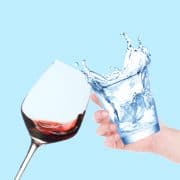Alcohol Free Days – Why Do It?

It’s very common for people to wind down after work with a drink. This may seem harmless enough, but the reality is that half of that bottle of wine or those few bottles of beer could be causing silent damage to your liver, with serious consequences.
It may surprise you to know that the majority of people who die from the alcohol-related liver disease are not alcoholics. Alcohol causes damage to the cells in your liver, which can lead to inflammation and scarring as it tries to repair itself. Even if you only have one or two drinks a day, your liver can’t cope and can’t repair itself, but you don’t have to become a ‘tea-totaller’ to fix it.
Your liver needs at least 48 hours without alcohol to repair itself. Cutting back your daily intake won’t help your liver. The 2 days have to be alcohol-free and it’s important they are ‘consecutive’. At Ritualize, we include an Alcohol-Free Day on our Ritual lists. By adding it to your personal Rituals, you’ll be giving your liver a break and bringing your BioAge down.
“The main advantage of two alcohol-free days each week – as opposed to occasional alcohol-free days when you’re sick, for instance – is that it reduces your lifetime exposure to alcohol, which in turn helps lower the risk of both liver disease and alcohol-related cancers such as cancer of the breast, colon, oesophagus and mouth,” says Associate Professor Simone Strasser, a gastroenterologist and spokeswoman for the Australian Liver Association. (1)
The Australian Government Guidelines recommends no more than 2 standard drinks on any given day for both men and women. (2). This can be confusing as it implies that drinking every day is safe. The United Kingdom has recently reviewed their guidelines and now recommends that everyone should have alcohol-free days each week. (3)
Alcohol over time can cause also cause brain damage, heart disease, high blood pressure and increase your risk of many cancers such as breast cancer, mouth and intestinal cancers.
Aside from reducing your risk of disease, there are other reasons to have a 2-day break from alcohol:
Your quality of sleep will improve.
When you drink before bed, you don’t fall into a natural slumber. It’s common for people to fall asleep quickly, so many think that glass of wine or 2 helps them get to sleep. But then they wake up around 3am and are wide awake. This could be due to a sleep-inducing chemical in the brain called adenosine, which is increased after drinking. You fall asleep quickly, but the chemical is quickly depleted, which can cause you to wake before earlier than your body wants to. (https://sleepfoundation.org/sleep-topics/how-alcohol-affects-sleep)
Alcohol also blocks your rapid eye movement (REM) sleep which is imperative for growth and repair. Less REM sleep can cause you to be tired and lack in focus the next day.
You’ll lose weight
Alcohol contains empty calories, which means you are taking in calories that your body doesn’t need. A glass of wine can contain 120 calories and a beer about 150 calories. When you have a break from alcohol, you not only cut down on these empty calories, but you tend to make healthier food choices.
Your skin will glow
Alcohol dehydrates you, which can dry your skin and over time cause you to look older than you are. The increase in blood flow can cause a red pigmentation.
Your mood will increase
You may feel happier while you’re drinking, but the next day alcohol can make you feel down. This is because alcohol is a depressant and affects the balance of hormones in the brain. Having a few Alcohol-free days can make you feel a lot brighter.
It’s always advisable to drink alcohol in moderation on the days you do drink and know that you and your liver will enjoy your 48 hours without it. Make it a weekly ritual and reap the benefits.
INFORMATION FROM PARTNERS
SleepAdvisor: Does Alcohol Affect Sleep? What You Need to Know Before Bed
REFERENCES
(2) http://www.alcohol.gov.au/internet/alcohol/publishing.nsf/Content/guide-adult
(3) http://www.bbc.com/news/uk-35252650



